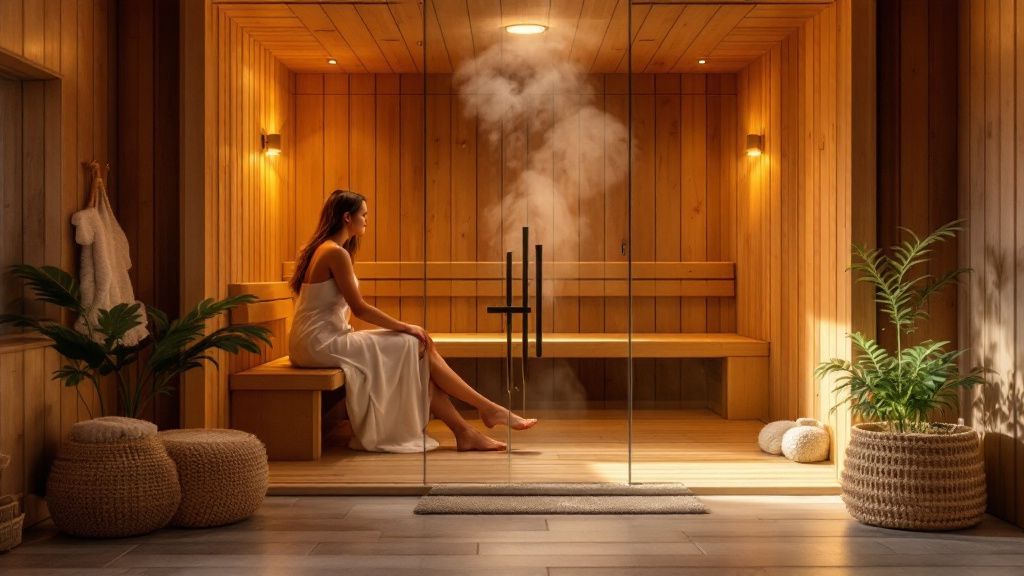Stepping into a sauna envelops you in intense warmth, offering relaxation and rejuvenation. However, this tranquil escape can sometimes lead to unexpected lightheadedness. The heat from the sauna causes your blood vessels to dilate, improving circulation and lowering blood pressure. This sudden change might make you feel dizzy, especially if you aren't accustomed to such environments. Dehydration is another factor; in the sauna, you lose fluids rapidly, which can affect blood flow and pressure. When considering how long to stay in a sauna, it's important to monitor how you feel and rehydrate properly to minimize the risk of lightheadedness.
What Happens to Your Body in a Sauna
As you enter a sauna, the intense heat begins to affect your body in intriguing ways. Your core temperature rises, prompting blood vessels to expand. This increased circulation often leads to flushed skin and a calming sensation. Concurrently, your sweat glands activate to cool you down, which, while beneficial, also contributes to fluid loss. Monitoring how long to stay in the sauna is crucial to avoid dehydration and potential lightheadedness.
One of the most frequently asked questions about sauna usage is, "How does it impact cardiovascular health?" The answer lies in the significant cardiovascular workout it provides without the strain of exercise. Improved circulation can enhance heart health, yet it's essential to balance sauna sessions with rest periods to maintain a healthy blood pressure and avoid dizziness.
During your time in the sauna, your muscles also experience benefits. The heat promotes relaxation and can alleviate tension, making you feel more at ease. This soothing effect is why many people incorporate sauna sessions into their wellness routines. However, staying too long can lead to an uncomfortable level of fatigue.
Understanding how your body reacts in a sauna is vital for maximizing benefits. By paying attention to your body's signals and staying hydrated, you can enjoy this time without adverse effects like lightheadedness. The balance between relaxation and caution ensures an enjoyable and safe experience.
Common Reasons for Feeling Lightheaded
Experiencing lightheadedness after a sauna session can be unsettling. The primary reason is often dehydration. When you sweat profusely without replenishing fluids, your blood volume decreases, which can cause dizziness. This is especially true if you're not mindful of how long to stay in a sauna, as overextension can exacerbate fluid loss and contribute to feeling lightheaded.
Temperature changes also play a significant role in lightheadedness. Upon leaving a hot sauna, your internal temperature drops as your body works to stabilize. This rapid shift can temporarily disturb your blood flow and result in dizziness. Ensuring a gradual transition from the sauna environment helps your body adapt more smoothly.
Looking at the experience of lightheadedness through the lens of individual health factors, we see that blood pressure fluctuations and low blood sugar can also be culprits. If you’re prone to these conditions, the heat and related stress can amplify their effects. Being aware and prepared, such as by eating a light snack beforehand, can help mitigate these sensations.
Minor physical exertion can trigger lightheadedness, too. The heat amplifies your heart rate, making even small movements more tiring. Understanding these common reasons and taking preventive steps can greatly enhance your sauna experience, keeping it both enjoyable and safe.

Identifying Personal Risk Factors
Recognizing personal risk factors is crucial for avoiding lightheadedness in the sauna. Factors like age, medication, and overall health can increase susceptibility. Older adults and those on certain prescriptions, such as beta-blockers, should exercise caution, as these can influence how your body responds to heat. Awareness of your health status can help you manage your sauna sessions safely.
What most people don’t see about using a sauna is the behind-the-scenes insight into hydration's importance. Dehydration isn't immediately obvious, yet it plays a significant role in sauna safety. If you're not consuming enough fluids throughout the day, you may be more prone to the effects of lightheadedness. Regularly drinking water before and after sauna use is key.
Your fitness level can also affect how you experience sauna sessions. Well-conditioned individuals may handle heat better than those who are not as active. Yet, intense exercise prior to visiting a sauna can leave you vulnerable to lightheaded spells due to increased bodily strain. Self-assessment of physical readiness is essential.
Nutrition plays an underrated role in mitigating risks. Eating a balanced diet ensures your body receives the necessary nutrients to withstand sauna sessions. Skipping meals can leave you feeling weaker, more so after exposure to intense heat. Proper nourishment supports your body in maintaining stability during and after your sauna experience.

How to Safely Use a Sauna
Using a sauna safely requires attentiveness to your body's signals and mindful preparation. The first step is to hydrate properly before entering. Hydration combats the common challenge of dehydration-induced lightheadedness—by drinking water ahead of time, you enhance your body's ability to manage the heat. It's also important to set a reasonable limit on how long to stay in the sauna; typically, 15-20 minutes at a time is advisable for most individuals.
One of the challenges in sauna use is managing your core temperature and circulation without overburdening your cardiovascular system. This issue can be resolved by alternating brief cooling periods between sauna sessions. Stepping out of the sauna to cool off allows your body to regulate its temperature more effectively, preventing dizziness and fatigue. This also helps your body acclimate gradually to temperature changes without abrupt stress.
Moreover, listening to your body is paramount. If you begin to feel uncomfortable or dizzy, it’s crucial to exit the sauna promptly. Bringing a small towel to wipe away sweat can aid in maintaining comfort, while a robe or slippers can prevent heat shock when leaving the sauna. Additionally, avoiding alcohol or heavy meals before sauna use can minimize stress on your system, reducing the chance of adverse effects.
Incorporating these safety measures will enhance your sauna experience, promoting relaxation while minimizing the risks associated with lightheadedness. It's all about finding a balance that keeps your sessions enjoyable and aligned with your body's needs.
When to Seek Medical Advice
Understanding when to seek medical advice is crucial if you experience lightheadedness after a sauna session. If dizziness persists or worsens despite taking the usual precautions, it might indicate an underlying health issue. This could be related to blood pressure instability, dehydration, or another condition that requires professional assessment. Persistent symptoms warrant a consultation with a healthcare professional for tailored advice.
Experiencing additional symptoms such as confusion, palpitations, or chest pain should prompt immediate medical attention. These symptoms could suggest a more serious condition exacerbated by sauna use. To make the most of your sauna sessions, try maintaining a health journal. Note any recurring symptoms to provide your doctor with detailed insights, helping them diagnose potential issues accurately.
If you have existing health conditions like heart disease or low blood pressure, speaking with a healthcare provider before continuing sauna use is beneficial. They can provide guidance on safe practices personalized to your health status. This proactive approach allows you to enjoy the benefits of saunas without undue risk.
Remember that occasional lightheadedness may not be alarming, but regular occurrences signal the need for evaluation. Ensuring proper hydration, monitoring how long to stay in the sauna, and adjusting your sessions based on your well-being can prevent unnecessary medical issues. Being proactive about your health can enhance your sauna experience, keeping it both beneficial and safe.

